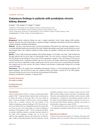 32 citations,
September 2018 in “Clinical Obstetrics and Gynecology”
32 citations,
September 2018 in “Clinical Obstetrics and Gynecology” Hormone therapy for transgender females increases the risk of blood clots and requires careful dosing, monitoring, and lifelong management.
 30 citations,
June 2012 in “Current Opinion in Endocrinology, Diabetes and Obesity”
30 citations,
June 2012 in “Current Opinion in Endocrinology, Diabetes and Obesity” Nonclassic congenital adrenal hyperplasia is a genetic disorder causing hormone imbalances, affecting fertility and requiring personalized treatment.
 26 citations,
December 2016 in “Psychiatric Clinics of North America”
26 citations,
December 2016 in “Psychiatric Clinics of North America” Testosterone therapy and surgeries like mastectomy improve transgender men's lives and mental health with low risks and high satisfaction.
 26 citations,
October 2014 in “Andrologia”
26 citations,
October 2014 in “Andrologia” Infertile men are more likely to produce sperm with abnormal chromosome numbers, which can affect pregnancy success and embryo health.
 25 citations,
March 2000 in “Journal of Endocrinological Investigation”
25 citations,
March 2000 in “Journal of Endocrinological Investigation” Testosterone therapy aims to treat hormone deficiencies and various conditions safely and effectively, but requires careful patient monitoring due to potential side effects.
 23 citations,
February 2021 in “Journal of Endocrinological Investigation”
23 citations,
February 2021 in “Journal of Endocrinological Investigation” Betacoronaviruses, like COVID-19, may cause hormone system dysfunction and affect disease susceptibility and severity.
 23 citations,
August 2005 in “Expert opinion on pharmacotherapy”
23 citations,
August 2005 in “Expert opinion on pharmacotherapy” New treatments for low male hormones improved sexual function and mood but had unclear risks, especially for older men.
 23 citations,
May 1984 in “Journal of the American Geriatrics Society”
23 citations,
May 1984 in “Journal of the American Geriatrics Society” Benign Prostatic Hyperplasia may be caused by changes in how the body processes male hormones.
 22 citations,
June 2007 in “Radiologia Medica”
22 citations,
June 2007 in “Radiologia Medica” Testicular microlithiasis may increase the risk of testicular cancer and patients with it should be closely monitored.
 21 citations,
January 2020 in “General and Comparative Endocrinology”
21 citations,
January 2020 in “General and Comparative Endocrinology” Lack or blocking of SRD5a, a key component in hormone creation, can lead to conditions like pseudohermaphrodism and affect hair growth, bone mass, muscle strength, and reproductive health. More research is needed on its regulation from fertilization to adulthood.
 21 citations,
April 2010 in “Veterinary Dermatology”
21 citations,
April 2010 in “Veterinary Dermatology” Hydroxychloroquine showed some potential, but overall, the three drugs had limited success in treating lupus in dogs.
 20 citations,
December 2016 in “American Journal of Clinical Dermatology”
20 citations,
December 2016 in “American Journal of Clinical Dermatology” Men prefer less invasive cosmetic procedures and need different treatment approaches than women.
 20 citations,
September 2005 in “Endocrinology”
20 citations,
September 2005 in “Endocrinology” Certain changes to the B-ring of androgen receptor ligands can increase their effectiveness for potential treatments of muscle and bone conditions.
 19 citations,
February 2012 in “International Journal of Urology”
19 citations,
February 2012 in “International Journal of Urology” In Japan, sex reassignment surgery for gender identity disorder faces challenges and needs better medical support and education.
 18 citations,
July 2020 in “Basic and Clinical Andrology”
18 citations,
July 2020 in “Basic and Clinical Andrology” Wait 3 months after COVID-19 before trying assisted reproduction and further research is needed on COVID-19's effects on male hormones and fertility.
 18 citations,
June 2002 in “BJUI”
18 citations,
June 2002 in “BJUI” Finasteride doesn't change rat testicle weight or sperm production.
 18 citations,
January 2001 in “Annual Reports in Medicinal Chemistry”
18 citations,
January 2001 in “Annual Reports in Medicinal Chemistry” Selective Androgen Receptor Modulators (SARMs) are drugs that can control the effects of androgens in different tissues, potentially having fewer side effects and promising for treating various conditions.
 17 citations,
November 2013 in “American Journal of Primatology”
17 citations,
November 2013 in “American Journal of Primatology” Different monkey species in a lab showed varying levels of hair loss due to factors like type, sex, age, season, and living conditions.
 17 citations,
March 2006 in “BJU international”
17 citations,
March 2006 in “BJU international” Using buccal mucosa for hypospadias repair in children is effective and reduces complications.
 17 citations,
June 1996 in “The Journal of Steroid Biochemistry and Molecular Biology”
17 citations,
June 1996 in “The Journal of Steroid Biochemistry and Molecular Biology” FCE 28260 is a stronger and longer-lasting inhibitor of 5α-reductase than finasteride, which may make it a better treatment for certain medical conditions.
 15 citations,
March 2014 in “Molecular Medicine Reports”
15 citations,
March 2014 in “Molecular Medicine Reports” α-spinasterol from Melandrium firmum can help reduce prostate enlargement.
 14 citations,
April 2021 in “Biology”
14 citations,
April 2021 in “Biology” Thai rice bran extracts, especially from Tubtim Chumphae rice, can significantly reduce the activity of hair loss genes, with x-tocopherol showing potential as an anti-hair loss product.
 14 citations,
March 2016 in “Cutaneous and Ocular Toxicology”
14 citations,
March 2016 in “Cutaneous and Ocular Toxicology” Synthetic cannabinoid addiction can cause skin problems like acne and hair loss.
 14 citations,
November 1982 in “British Journal of Dermatology”
14 citations,
November 1982 in “British Journal of Dermatology” Testosterone conversion to 5α-DHT may not be essential for its effects on the skin.
 12 citations,
October 2018 in “International Journal of Women's Dermatology”
12 citations,
October 2018 in “International Journal of Women's Dermatology” Hormone therapy in transgender women can affect hair growth and acne, and there are specific skin issues related to gender-affirming surgery, but more research is needed on their dermatological health.
 12 citations,
June 2016 in “Reviews in Endocrine and Metabolic Disorders”
12 citations,
June 2016 in “Reviews in Endocrine and Metabolic Disorders” Some skin diseases and their treatments can negatively affect male fertility.
 12 citations,
January 1991 in “Archives of dermatological research”
12 citations,
January 1991 in “Archives of dermatological research” Male hormones control a specific gene in hamster skin, with different hormones having varying effects.
 11 citations,
March 2016 in “Journal of the European Academy of Dermatology and Venereology”
11 citations,
March 2016 in “Journal of the European Academy of Dermatology and Venereology” Almost all patients with chronic kidney disease not yet on dialysis have at least one skin problem.
 11 citations,
January 2016 in “Journal of clinical & experimental dermatology research”
11 citations,
January 2016 in “Journal of clinical & experimental dermatology research” Substance abuse can cause various skin problems, including marks from injections, sores, premature aging, and increased cancer risk.
 11 citations,
February 2011 in “Current Zoology”
11 citations,
February 2011 in “Current Zoology” About 20% of Japanese macaques had head alopecia, and stress and environment might cause hair loss.






























